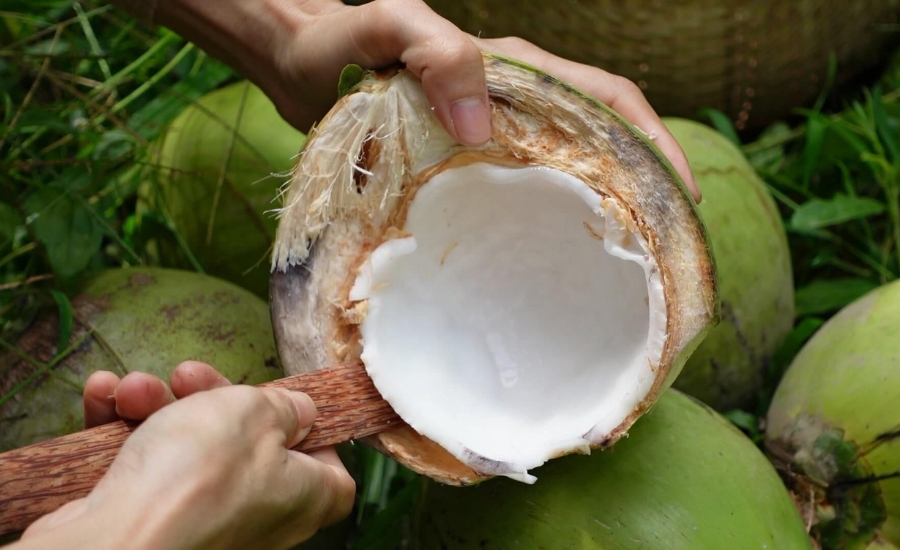Maintaining optimal hydration should be the pinnacle of your nutritional strategy during the summer months. Beyond plain water, coconut water has emerged as a popular alternative for many seeking to ward off dehydration. The consumption of coconut water is associated with a multitude of health advantages. It is an excellent source of vital nutrients such as calcium, magnesium, potassium, and phosphorus. Furthermore, it is teeming with antioxidants.
Coconut water also plays a beneficial role in cardiovascular health and is favorable for individuals managing diabetes. However, the common practice of consuming only the water and disregarding the coconut means you could overlook the substantial benefits of the coconut’s interior flesh, also known as malai.
The creamy substance inside the coconut, often referred to as malai, is laden with health-enhancing properties. This soft layer can be easily extracted and enjoyed in its natural state. Let’s delve into the numerous health benefits associated with consuming coconut malai.
8 HEALTH BENEFITS OF COCONUT MALAI IN SUMMER
Harvested from the matured flesh of coconuts, coconut malai is abundant in medium-chain triglycerides (MCTs), lauric acid, and various advantageous compounds. Let’s delve deeper into its health benefits, as illuminated by a Dietician and Nutritionist.
Combatting Summer Heat
The nutritionist enlightens us that consuming coconut malai can effectively withstand summer’s intense heat. It imparts a cooling sensation to the body, providing relief.
Coconut malai also possesses cooling properties, making it a crucial ally during the sweltering summer months. Not only does coconut malai energize your body, but it also provides a refreshing effect. Nothing beats indulging in a cup of coconut malai if you’re looking for healthy ways to beat the heat. It replenishes your body’s water content and wards off dehydration.
Enhancing Gut Health
The integrity of your gut has far-reaching implications for your overall well-being. Coconut malai is known to fortify your gut bacteria, improving gut health. Besides coconut malai, incorporating probiotics and prebiotics into your diet can also benefit your gut.
Coconut malai is rich in fiber content, which promotes bowel regularity and aids in bulking up the stool, thus maintaining a healthy digestive system. Moreover, the high fiber content in coconut has been shown to lower blood sugar levels. This is because the fiber in coconut slows down the conversion of carbohydrates into sugar, consequently reducing blood sugar levels.
Mitigating Inflammation
Unchecked inflammation can be detrimental to your health. Some foodstuffs possess natural anti-inflammatory properties, with coconut malai being a notable example.
Enhancing Cardiovascular Health
Coconut malai contains traces of coconut oil, which benefits your heart health. It helps elevate the levels of good cholesterol. According to health experts, the coconut oil present in the flesh of the coconut can increase HDL (high-density lipoprotein, or ‘good’ cholesterol) and decrease LDL (low-density lipoprotein, or ‘bad’ cholesterol).
Boosting Immunity
The antioxidants and manganese in coconut enhance the immune system while mitigating inflammation.
Improving Cognitive Function
The MCTs (medium-chain triglycerides) found in coconut flesh serve as an alternate energy source to glucose, potentially aiding individuals grappling with memory loss or cognitive decline.
Supporting Weight Management
Contrary to prevalent misconceptions, coconut meat supports weight loss when consumed in moderation rather than contributing to fat gain. The substantial fat content found in the heart of coconut can help you feel satiated for extended periods. Additionally, an adequate intake of protein also promotes long-term satiety.
Preventing Oxidative Stress
Oxidative stress results from an imbalance between your body’s antioxidants and free radicals. Coconut malai is replete with phenolic compounds that have the potential to neutralize these free radicals, thereby preventing oxidative stress.
FAQs
How much fat is in coconut malai?
Nutritional information (One cupTrusted Source of coconut meat contains)
| Calories | 283 |
| Protein | 2.66 grams (g) |
| Carbs | 12.2 g |
| Fat | 26.8 g |
| Sugar | 4.98 g |
| Fiber | 7.2 g |
| Selenium | 8.08 micrograms |
| Copper | 0.35 milligrams (mg) |
| Phosphorus | 90.4 mg |
| Potassium | 285 mg |
| Iron | 1.94 mg |
| Zinc | 0.88 mg |
| Manganese | 1.2 mg |
How much protein is in coconut malai?
| Name | Amount | Unit |
| Energy | 1480 | kJ |
| Protein | 3.33 | g |
| Total lipid (fat) | 33.5 | g |
| Ash | 0.97 | g |
Is coconut malai good for the stomach?
The high fiber content in this malai helps to regulate our digestive system by aiding timely stools and maintaining digestive activity in the bowel. Coconut malai helps to make your gut bacteria strong, bacteria present in our intestines.
Can we eat coconut malai daily?
Aids weight loss
If you eat 1 cup of coconut malai, you take 3 grams of protein, which is quite good for losing fat and gaining muscles. Even though eating a certain amount of coconut meat helps in weight loss but if consumed in excess, it can also lead to weight gain because of its high-fat levels.
Is coconut malai good for the liver?
Filled with amino acids. Coconut malai contains a very high ratio of several amino acids. Amino acids are essential for the muscles, liver, and nervous system. People suffering from liver disease must consume food items that contain amino acids.

